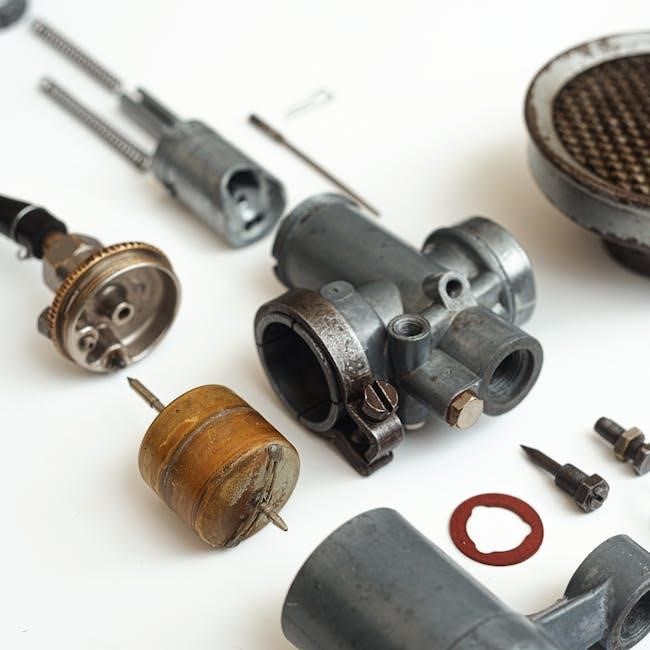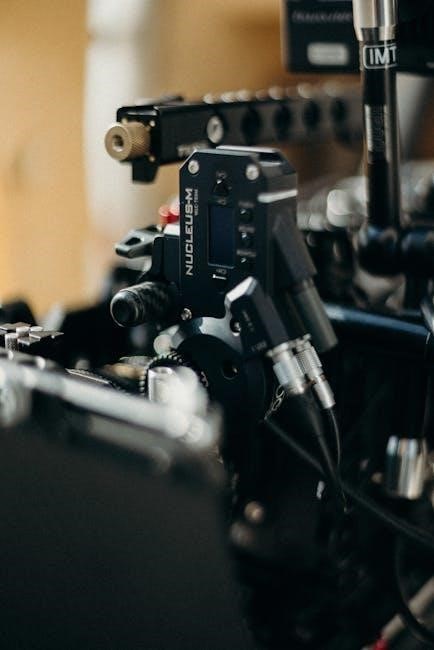The Detroit Diesel Series 60 12.7-liter engine is a renowned powerplant known for its durability and performance in heavy-duty applications. This engine is widely used in trucks, buses, and industrial equipment due to its high torque output and reliability. The manual provides essential guidance for maintenance, troubleshooting, and repair, ensuring optimal operation and compliance with emissions standards. It covers both diesel and natural gas variants, making it a comprehensive resource for technicians and operators.
1.1 Overview of the Engine and Its Applications
The Detroit Diesel Series 60 12.7-liter engine is a robust, high-performance powerplant designed for heavy-duty applications. Widely used in on-highway trucks, construction equipment, and industrial machinery, it is known for its reliability and efficiency. This engine is a popular choice for its durability and versatility across various industries, making it a cornerstone of modern heavy-duty operations.
1.2 Importance of the Manual for Maintenance and Repair
The manual is essential for proper maintenance and repair of the Detroit Diesel Series 60 12.7-liter engine. It provides detailed procedures, diagnostic guidance, and specifications to ensure optimal performance and compliance with emissions standards. Technicians rely on this resource to accurately service the engine, addressing issues efficiently and maintaining its longevity and reliability.

Technical Specifications of the Detroit Diesel Series 60 12.7-Liter Engine
The Detroit Diesel Series 60 12.7-liter engine features a robust design, delivering impressive torque output and fuel efficiency. Equipped with the DDEC electronic control system, it ensures precise performance and compliance with EPA07 emission standards.
2.1 Key Features and Design Elements
The Detroit Diesel Series 60 12.7-liter engine features a robust, high-performance design. Available in both diesel and natural gas variants, it incorporates advanced EGR technology for reduced emissions. Its durable construction and precise DDEC electronic control system ensure efficient operation across various applications, including heavy-duty trucks and industrial equipment.
2.2 Performance Metrics and Torque Output
The Detroit Diesel Series 60 12.7-liter engine delivers impressive performance, producing high torque output and horsepower. With a range of power ratings, it excels in heavy-duty applications, offering fuel efficiency and reliability. Its robust design ensures consistent performance, making it a preferred choice for demanding industrial and transportation needs.
2.3 Emission Control Technologies and Compliance
The Detroit Diesel Series 60 12.7-liter engine incorporates advanced emission control technologies, including the EGR system, to meet stringent EPA standards. Designed for compliance with EPA07 regulations, it effectively reduces emissions while maintaining performance. The engine’s electronic control systems ensure efficient operation, making it an environmentally responsible choice for heavy-duty applications.

Maintenance Schedule and Procedures
Regular servicing, oil changes, and filter replacements are crucial. Adhering to the manual’s schedule ensures optimal performance and longevity of the engine.
3.1 Recommended Service Intervals
Service intervals for the Detroit Diesel Series 60 12.7-liter engine are critical for maintaining performance. The manual recommends oil changes every 10,000 to 50,000 miles, depending on usage. Regular inspections of filters, belts, and fluid levels ensure reliability. Adhering to these schedules prevents premature wear and extends engine lifespan.
3.2 Essential Maintenance Tasks for Optimal Performance
Regular oil and filter changes, coolant inspections, and belt replacements are vital. Monitoring the EGR system and ensuring proper DDEC functionality are also crucial. Following the manual’s guidelines helps maintain peak performance, reduces emissions, and prevents unexpected breakdowns, ensuring the engine operates efficiently under varying load conditions.
3.3 Lubrication and Fluid Requirements
Proper lubrication and fluid management are critical for the Detroit Diesel Series 60 12.7-liter engine. Use synthetic oil meeting Detroit Diesel specifications for optimal performance. Coolant should be a 50/50 mix of ethylene glycol and water. Regularly check and maintain fuel, hydraulic, and coolant levels to prevent damage and ensure emissions compliance.
Troubleshooting and Diagnostics
The Detroit Diesel Series 60 12.7-liter engine utilizes the DDDL tool for advanced diagnostics. Common issues include fault codes and EGR-related problems, which are addressed through the DDEC system and regular sensor checks.
4.1 Common Issues and Symptoms
Common issues with the Detroit Diesel Series 60 12.7-liter engine include EGR system malfunctions, DPF clogging, and fault codes related to sensor failures. Symptoms may include reduced power, increased fuel consumption, and warning lights on the dashboard. Regular diagnostics using DDDL tools help identify these problems early, ensuring timely repairs.
4.2 Diagnostic Tools and Techniques
The Detroit Diesel Diagnostic Link (DDDL) is a primary tool for diagnosing DDEC systems, enabling technicians to identify fault codes and monitor engine performance. Additional tools include digital multimeters for voltage checks, compression testers for cylinder analysis, and scan tools for real-time data. These tools aid in precise troubleshooting and efficient repairs.
4.3 DDEC (Detroit Diesel Electronic Control) System Troubleshooting
The DDEC system monitors and controls engine functions, enabling advanced diagnostics. Common issues include fault codes for sensors, fuel injectors, and EGR systems. Using the Detroit Diesel Diagnostic Link (DDDL), technicians can retrieve codes, analyze data, and perform calibrations. Regular software updates ensure optimal system performance and troubleshooting efficiency.

Electronic Control Systems (DDEC II and DDEC IV)
DDEC II and DDEC IV systems enhance engine performance through advanced electronic control, optimizing fuel injection and emissions. These systems improve diagnostics and overall engine efficiency significantly.
5.1 Functionality and Benefits
DDEC II and DDEC IV systems provide precise control over fuel injection, timing, and emissions. They offer enhanced diagnostic capabilities, improved fuel efficiency, and reduced emissions. These systems also enable real-time monitoring and adaptive learning, ensuring optimal engine performance under various operating conditions. Their advanced functionality minimizes mechanical failures and extends engine lifespan.
5.2 Calibration and Upgrades
Calibration ensures the DDEC system operates within specified parameters, optimizing performance and efficiency. Upgrades, such as software updates, enhance functionality and compliance with emissions standards. Proper calibration and upgrades require specialized tools like the Detroit Diesel Diagnostic Link (DDDL), ensuring precise adjustments for optimal engine operation and longevity.
5.3 Integration with Modern Diagnostic Tools
The DDEC system seamlessly integrates with modern diagnostic tools, enabling real-time monitoring and advanced troubleshooting. Tools like the Detroit Diesel Diagnostic Link (DDDL) provide detailed insights, ensuring efficient maintenance and compliance with emissions standards. This integration enhances diagnostic accuracy and streamlines repair processes for optimal engine performance and longevity.

EGR (Exhaust Gas Recirculation) System
The EGR system reduces emissions by recirculating exhaust gases, lowering nitrogen oxide levels. It is a critical component of the engine’s emissions control, as detailed in the manual.
6.1 Operation and Purpose
The EGR system operates by recirculating a portion of exhaust gases back into the engine’s combustion chamber. This process reduces nitrogen oxide emissions by lowering combustion temperatures. The system includes components like EGR valves and coolers, working in conjunction with the DDEC electronic control system to ensure optimal performance and emissions compliance.
6.2 Maintenance and Repair Tips
Regular inspection of EGR components is crucial to prevent clogging and ensure proper function. Cleaning or replacing the EGR valve and cooler as needed helps maintain efficiency. Technicians should also check for leaks and ensure all connections are secure. Proper diagnostic tools, like the Detroit Diesel Diagnostic Link, can aid in identifying issues promptly.
6.3 Troubleshooting Common EGR-Related Issues
Common EGR issues include clogged coolers, faulty sensors, and stuck valves. Symptoms may include decreased performance, increased emissions, or engine warning lights. Using diagnostic tools like the Detroit Diesel Diagnostic Link (DDDL) can help identify problems quickly. Regular cleaning and inspections are essential to prevent these issues.

Performance and Fuel Efficiency
The Detroit Diesel Series 60 12.7-liter engine balances power with efficiency, delivering robust performance while optimizing fuel consumption. The manual provides tips to enhance fuel economy and maintain peak output.
7.1 Optimizing Engine Performance
Optimizing the Detroit Diesel Series 60 12.7-liter engine involves regular maintenance, proper calibration of the DDEC system, and ensuring the EGR system functions efficiently. Monitoring fuel injection timing and turbocharger performance also enhances power output and overall efficiency, as outlined in the manual.
7.2 Fuel Economy Tips and Best Practices
Regular maintenance, proper tire inflation, and optimizing engine performance are key to improving fuel economy. Avoid aggressive driving, maintain consistent speeds, and ensure the EGR system functions correctly. Monitoring fuel injection timing and addressing any issues promptly can also enhance efficiency, as detailed in the manual.
7.3 Impact of Proper Maintenance on Efficiency
Proper maintenance significantly enhances fuel efficiency and overall engine performance. Regular servicing, including EGR system upkeep and DDEC calibration, ensures optimal combustion and reduces fuel waste. Adhering to the manual’s guidelines promotes engine longevity and minimizes operational costs, making routine checks essential for sustained efficiency and reliability over time.

Emission Control and Environmental Impact
The Detroit Diesel Series 60 12.7-liter engine incorporates advanced emission control technologies to minimize environmental impact while meeting stringent EPA standards, ensuring cleaner and more efficient operation.
8.1 Emission Standards and Compliance
The Detroit Diesel Series 60 12.7-liter engine is designed to meet strict EPA emissions standards, utilizing advanced technologies such as the EGR system to reduce nitrogen oxides and particulate matter, ensuring compliance with regulatory requirements for cleaner air quality and environmental sustainability;
8.2 Role of the EGR System in Emission Control
The EGR (Exhaust Gas Recirculation) system plays a critical role in reducing nitrogen oxide (NOx) emissions by recirculating a portion of exhaust gases into the engine cylinders, lowering combustion temperatures and reducing emissions. This technology is essential for meeting EPA standards and ensuring the engine operates within environmental regulations. Proper EGR function is vital for compliance.
8.3 Best Practices for Reducing Environmental Impact
Regular maintenance, proper engine tuning, and ensuring the EGR system functions correctly are essential for minimizing environmental impact. Using the correct fluids and filters, adhering to service intervals, and upgrading to genuine parts when necessary also contribute to reduced emissions and sustainable operation of the Detroit Diesel Series 60 engine.
Common Repairs and Replacement Parts
Timely repairs and genuine parts are crucial for maintaining performance. Common replacements include fuel injectors, EGR components, and turbochargers. The manual and diagnostic tools like DDDL ensure accurate troubleshooting and efficient part replacement, minimizing downtime and extending engine life.
9.1 Frequently Replaced Components
Commonly replaced parts include fuel injectors, EGR coolers, turbochargers, and water pumps. High mileage and wear often necessitate these replacements. The DDEC system aids in diagnosing issues, ensuring timely component swaps. Using genuine parts is crucial for maintaining performance and reliability, as outlined in the Detroit Diesel manual and diagnostic tools like DDDL.
9.2 Tips for Identifying and Addressing Wear and Tear
Regular inspections of fuel injectors, EGR systems, and turbochargers help identify wear early. Monitor performance metrics via the DDEC system for anomalies. Addressing wear promptly, such as replacing worn components with genuine parts, ensures reliability. Always follow the manual’s guidelines for inspections and maintenance to prevent costly repairs and downtime.
9.3 Sources for Genuine and Aftermarket Parts
Genuine parts are available through authorized Detroit Diesel dealers and trusted distributors. Aftermarket options can be sourced from reputable retailers specializing in heavy-duty engine components. Ensure compatibility with your Series 60 engine by verifying part numbers and specifications in the official manual or via the DDEC system.
Resources and References
Official Detroit Diesel manuals, online forums, and diagnostic tools like DDDL provide valuable resources. Genuine parts and repair guides ensure accurate servicing and maintenance of the Series 60 engine.
10.1 Official Detroit Diesel Manuals and Guides
The official Detroit Diesel manuals provide detailed instructions for servicing the Series 60 engine. These guides include operation procedures, maintenance schedules, and troubleshooting tips, ensuring technicians have comprehensive resources for optimal engine performance and compliance with emissions standards. They are essential for professionals working with this powerful engine.
10.2 Online Communities and Forums
Online communities and forums dedicated to the Detroit Diesel Series 60 engine provide valuable resources for technicians and operators. Platforms like Diesel Forum and TruckersReport offer troubleshooting tips, repair advice, and discussions on engine maintenance. These communities often share real-world experiences and solutions, making them a valuable supplement to official manuals and diagnostic tools.
10.3 Diagnostic Software and Tools
Diagnostic software like the Detroit Diesel Diagnostic Link (DDDL) is essential for troubleshooting and calibrating the Series 60 engine. These tools enable real-time monitoring of engine performance, fault code analysis, and system calibration. They are indispensable for technicians to efficiently diagnose and resolve issues, ensuring optimal engine operation and compliance with emissions standards.
The Detroit Diesel Series 60 12.7-liter engine is a reliable workhorse, requiring regular maintenance and proper diagnostics for optimal performance. Always refer to the official manual and use diagnostic tools like DDDL for accurate troubleshooting. Continuous learning and adherence to best practices ensure longevity and efficiency of the engine.
11.1 Summary of Key Takeaways
The Detroit Diesel Series 60 12.7-liter engine excels in heavy-duty applications, emphasizing maintenance and diagnostics for peak performance. Regular servicing, adherence to emission standards, and utilization of diagnostic tools like DDDL are crucial. Proper calibration of the DDEC system and timely replacement of wear-prone parts ensure efficiency and compliance with environmental regulations, maximizing engine lifespan and operational reliability.
11.2 Importance of Regular Maintenance and Proper Diagnostics
Regular maintenance and proper diagnostics are crucial for the Detroit Diesel Series 60 12.7-liter engine to ensure optimal performance and longevity. Timely servicing prevents potential issues, while advanced diagnostic tools like DDDL help identify and address problems early. This approach ensures compliance with emissions standards and maximizes engine efficiency and operational reliability over time.
11.3 Encouragement for Continuous Learning and Professional Development
Continuous learning and professional development are vital for mastering the Detroit Diesel Series 60 12.7-liter engine. Stay updated with the latest diagnostic tools, service manuals, and emission standards. Engaging with online forums and official guides ensures technicians remain proficient, enhancing efficiency and compliance. Invest in ongoing education to stay ahead in the field.
